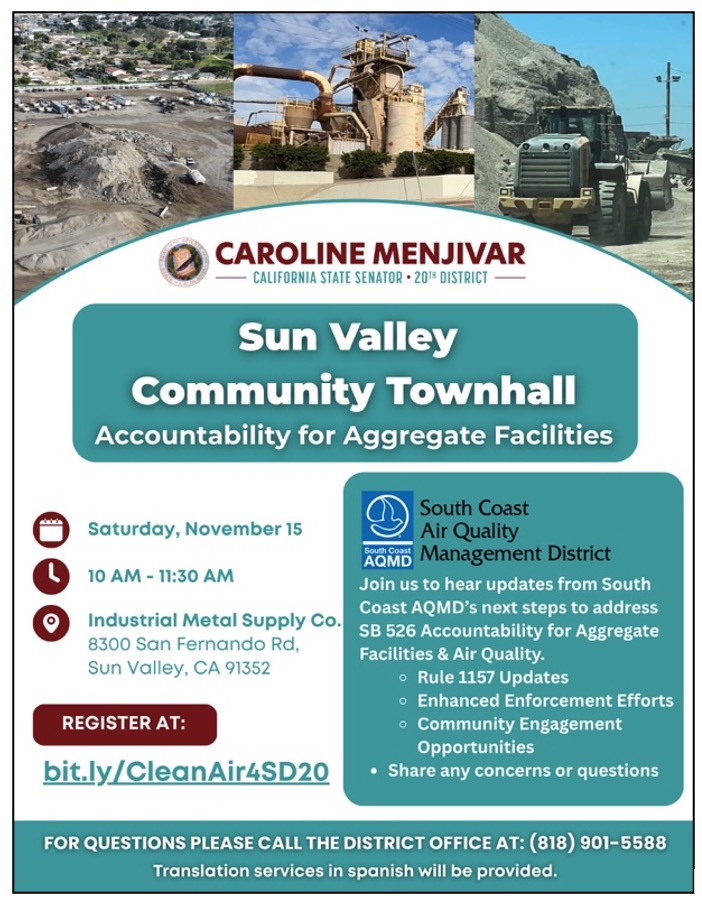Comments
CLIMATE WATCH - In Sun Valley, a working-class neighborhood tucked in the San Fernando Valley, residents say they can taste the dust in the air - gritty, metallic, and relentless. From dawn to dusk, heavy trucks roar down narrow streets as conveyor belts grind crushed rock just yards from homes and a local park. It’s an environmental hazard hiding in plain sight - and one that existing laws are supposed to prevent. Instead, residents are handed endless town halls, empty promises, and political theater without accountability. As Sun Valley’s industrial footprint has expanded, meaningful enforcement has withered.
The Law That Time Forgot
Rule 1157, a regulation adopted by the South Coast Air Quality Management District
(SCAQMD), was created to control particulate pollution from aggregate and recycling facilities. It was last amended in 2006 - nearly two decades ago. Since then, the region’s population and industrial activity have surged, but enforcement has not kept pace. The result? Residents breathe dangerous levels of particulate pollution every day. During storms, runoff from aggregate sites floods local streets and properties, carrying contaminated debris into homes - and still, no agency enforces stormwater controls. What good is a rule if it’s never enforced?
A Rule Without Teeth
Rule 1157 requires aggregate operators to suppress dust plumes, limit emissions to under 20 percent opacity, and maintain storage piles to prevent airborne particles. On paper, those standards look strong. In reality, they’re just on the paper. SCAQMD officials admit their enforcement system relies largely on complaints - meaning the burden falls on residents already struggling with over-pollution. “If I had to file a complaint for every violation, I’d have to quit my job and do it full-time,” one neighbor said.
Environmental Injustice in Plain Sight
- Families live beside towering piles of crushed concrete and asphalt, often less than 30 feet from their homes and parks.
- Many Sun Valley census tracts rank in the top 90th percentile statewide for pollution burden, officially labeled “disadvantaged communities.”
- Residents say inspectors show up, take photos, and disappear. Fines are rare. Follow-ups are inconsistent.
There’s no public database of inspections or penalties, and no way for residents to verify whether polluters are ever held accountable. The law exists only on paper - while dust coats cars, playgrounds, and windowsills.
Acknowledged - and Ignored
Even SCAQMD’s own 2025 internal report admitted “visible dust emissions affecting neighboring communities” and recommended updates such as fence-line monitoring and stricter pile limits. Yet the same report ignored diesel exhaust, noise, and light pollution - and failed to outline any enforcement plan.
Despite these findings, nothing has changed. Regulators continue to wait for residents to complain instead of conducting proactive inspections, shifting the burden to residents.
A Modest Step: Senate Bill 526
After years of community pressure, State Senator Caroline Menjivar introduced SB 526, directing SCAQMD to modernize Rule 1157. The bill would require real-time air monitoring, containment barriers, and limits on stockpile heights near homes and schools - safeguards already standard elsewhere. But even these commonsense reforms have met resistance. SCAQMD warned that legislative action might “impede” its rulemaking process - a response environmental groups view as pure deflection.
When Enforcement Follows Privilege
Sun Valley’s fight highlights a larger truth about Los Angeles: enforcement often follows privilege, not pollution. This predominantly Latino, lower-income neighborhood has become a dumping ground for the city’s dirtiest industries - from concrete plants and waste stations to metal yards and junk lots - while affluent areas enjoy strict oversight. California calls itself a leader in environmental justice. Yet as dust clouds linger over Sun Valley, that leadership feels hollow.
Accountability, Not Excuses
Updating and enforcing Rule 1157 isn’t just about cleaner air - it’s about restoring trust in public institutions. True accountability means transparent data, consistent enforcement, and genuine community representation at the table. Senate Bill 526 is a critical first step, but it must go further - addressing diesel emissions, blasting, truck traffic, light pollution, and noise. Every Angeleno deserves clean air, no matter their ZIP code. Until that happens, Sun Valley residents will keep breathing the dust of broken promises - waiting for the day when “enforcement” actually means something. And for those planning to attend the next town hall on Rule 1157, make sure you bring a mask. So far, the only thing that’s ever cleared the air here are the empty words drifting through it.

(Shoshannah Kalaydjian is a Jewish student who writes about education, identity, and the challenges facing the next generation. Growing up in today’s climate, she has witnessed firsthand how rising antisemitism affects young people in classrooms and on campuses. Shoshannah is committed to sharing the perspective of Jewish youth, amplifying student voices, and encouraging leaders to create safer, more inclusive environments for all students.)
(Mariam Moore is the CEO of The Climate Corps Initiative (TCCI), the first environmental non-profit organization dedicated to advocate for environmental justice in disadvantaged communities of color, including Sun Valley. She is also a community and public health advocate, and an environmental activist.)






